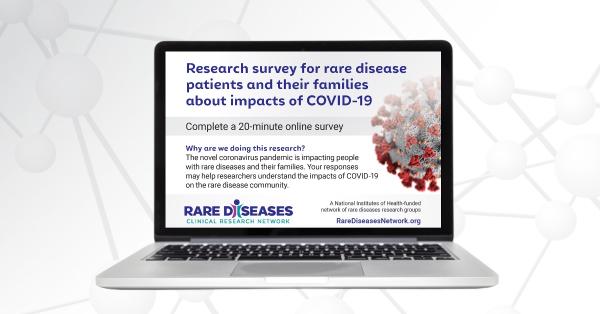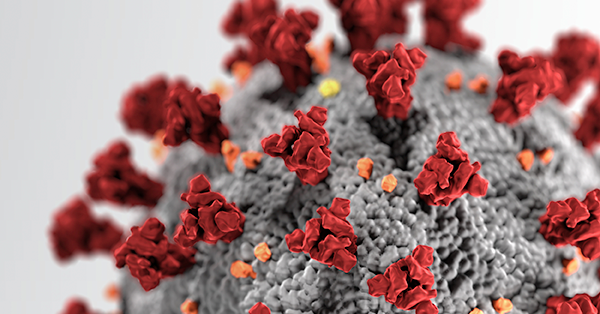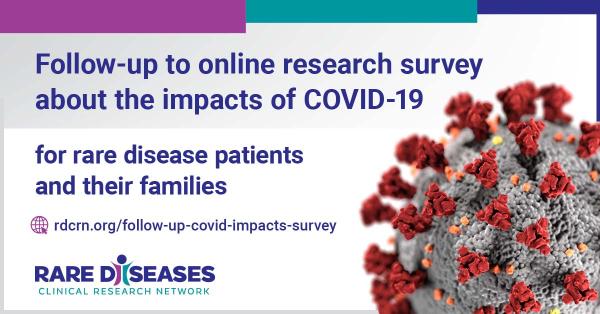Surveys on the Impacts of COVID-19 on the Rare Diseases Community
![]() The Rare Diseases Clinical Research Network (RDCRN) is a national network of top rare diseases researchers, powered by patient partnerships and funded by the National Institutes of Health. We are conducting a series of surveys to better understand the impacts of COVID-19 on the rare diseases community. We are looking for both individuals with rare diseases and participants in the NIH COVID-19 antibody study (COVIDSRCH) to serve as a comparison (control) group.
The Rare Diseases Clinical Research Network (RDCRN) is a national network of top rare diseases researchers, powered by patient partnerships and funded by the National Institutes of Health. We are conducting a series of surveys to better understand the impacts of COVID-19 on the rare diseases community. We are looking for both individuals with rare diseases and participants in the NIH COVID-19 antibody study (COVIDSRCH) to serve as a comparison (control) group.
For the estimated 25 million people in the United States living with a rare disease, the novel coronavirus disease COVID-19 presents many challenges. These surveys will help identify common issues with mental health support, access to treatment, vaccine availability and concerns, physical health, availability of supplies, or other problems. Your responses may help researchers understand the impacts of COVID-19 on the rare diseases community and on the general public.
ABOUT OUR COVID-19 IMPACT SURVEYS
Why are we doing this research?
These surveys aim to find out how the COVID-19 pandemic is impacting individuals with rare diseases, their families and their caregivers. Results will help the rare disease research community shed light on the needs of people with rare diseases during the COVID-19 pandemic and other potential health crises, in addition to informing future research efforts.
What surveys have been conducted so far?
To date, we have conducted an initial survey of the rare diseases community and published preliminary results:
- Initial survey for rare diseases patients and families about impacts of COVID-19 (May 2020)
- Preliminary results of the initial survey (February 2021) (Report and video)
In addition, the RDCRN has partnered with the National Institute of Health (NIH) on a serosurvey of people living with rare diseases. Read more here.
What surveys are now open?
Two surveys are now open for respondents:
- A follow-up survey to learn more about the experiences of individuals with rare diseases and their caregivers is open to those who completed the initial COVID-19 survey. If you completed the initial survey, you should have received an invitation and unique link to the follow-up survey via email. If you completed the initial survey but did not receive a link or have questions, please email rd.covid19@cchmc.org.
- A comparison cohort survey (for participants who took part in the COVIDSRCH study), so we can compare their responses with surveys completed by individuals living with rare diseases or their caregivers.
What Is the Rare Diseases Clinical Research Network (RDCRN)?
The RDCRN is a research network funded by the National Institutes of Health (NIH). It fosters research to better understand, diagnose, and treat rare diseases. Our 19 consortia—teams of scientists, physicians, and patients—each study a group of related rare diseases. Established by Congress under the Rare Diseases Act in 2002, the RDCRN is an initiative of the Division of Rare Diseases Research Innovation at the NIH’s National Center for Advancing Translational Sciences (NCATS).
How is the RDCRN advancing rare diseases research?
RDCRN consortia are studying nearly 200 rare diseases at more than 270 sites in the United States and around the world. We host the tools and services needed to make large-scale research studies possible. We also directly interact with patients and their advocates and train new investigators (scientists and doctors) in rare diseases research. See all the diseases we study.
FREQUENTLY ASKED QUESTIONS
UNDERSTANDING THE RESEARCH
What conditions are rare diseases?
In the United States, a rare disease is defined as a condition that affects fewer than 200,000 people. The NIH’s Genetic and Rare Diseases Information Center, hosted by NCATS, offers information on more than 10,000 rare diseases.
Who is maintaining the survey?
The Rare Diseases Clinical Research Network (RDCRN) and its Data Management and Coordinating Center based at Cincinnati Children’s Hospital Medical Center is managing the Contact Registry.
PARTICIPATING IN THE SURVEY
What will I be asked in the survey?
You will be asked to share your experience by completing our 20-minute online survey. Some things we hope to learn include:
- Who is becoming infected?
- Where do they live?
- What symptoms are they seeing?
- What treatments are they receiving?
- How is access to care changing?
- Are you able to obtain needed medical and nutritional supplies?
- How are stress and anxiety impacting patients and families?
- What is your experience with applying mandated public health precautions, ie, wearing a mask and social distancing?
- Have you been vaccinated or do you plan to be?
- Do you have concerns about the vaccines against COVID-19?
What diseases does the RDCRN Study?
Use the search tools on our Diseases Studied page to find the diseases we currently study. You can reach out to the indicated consortia or research groups for more information on those diseases and studies underway.
What will happen next?
We may follow up with you in the future to learn more about the ongoing impact of COVID-19 on your life. Summary results will be shared with study participants on this website. You will not be able to be identified in the survey results.
Can I exit the survey before it is complete and return to finish it later?
Yes. If you want to exit before completing the survey, you will be given a return code. Please write this down. You can continue where you left off by choosing “Returning?” in the upper right corner of the survey and enter your return code.
Why are patients from outside the United States excluded from the survey?
As a U.S.-based research organization, we limited the survey to patients based in the United States so we could begin capturing data on the impacts of COVID-19 as quickly as possible. The laws and regulations that oversee human subject’s research and sharing data within and outside the United States are different. If non-U.S. groups would like to collaborate with us on the survey, they can email us at rd.covid19@cchmc.org to explore options.
Will there be more follow-up surveys?
There is potential for additional follow-up studies in 2022 and beyond.
How will you share survey results with participants?
We plan to provide regular updates about survey participation through interim reports posted to our website. We will also make key results from the survey available to the rare disease community through the website. We may also publish reports of detailed analyses of the data in scientific journals, but we will ensure that key results are circulated directly to the community.
When will you share the results of the survey?
Preliminary results of our initial impacts survey can be found here. We will also add a dashboard to our website showing interim results of the follow-up survey as it is underway. Once the follow-up survey closes, the data will be analyzed, and summary results will be shared through our survey website.
When will the survey close?
The survey will close on Friday, July 1, 2022.
COMPENSATION
Will you be paid?
Participants will not receive payment for completing the survey.
DATA PROTECTION
How will my data be protected?
The survey database is built in REDCap, a secure, web-based platform. All RDCRN systems housed at Cincinnati Children’s Hospital Medical Center use centrally-managed endpoint protections (including anti-virus, traffic monitoring, and behavioral analysis as appropriate) with continuous updates. The data center is separated by network segmentation and firewalls from other networks, and the greater Cincinnati Children’s network is protected from external networks by firewalls, traffic analysis systems, and application gateways. The RDCRN environment is protected by both Amazon Web Services (AWS)-provided isolation as well as firewall and network segmentation.
WITHDRAWING CONTACT INFORMATION
What if I want my information removed from the RDCRN?
If you would like your information removed from the RDCRN, contact the COVID-19 Survey team at rd.covid19@cchmc.org. Once the team receives your request, they will work to remove your information from the main database.
ADDITIONAL INFORMATION
To learn more:
Questions? You can email the study team at rd.covid19@cchmc.org.
For more research opportunities
If you are interested in being contacted for future RDCRN related research opportunities, we invite you to join the RDCRN Contact Registry. To learn more about the registry, visit our website or email support@rdcrn.org.



